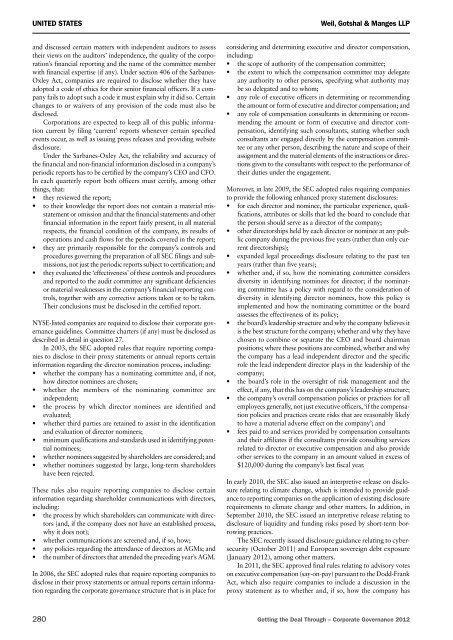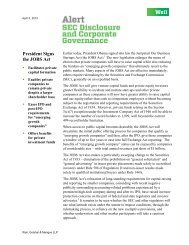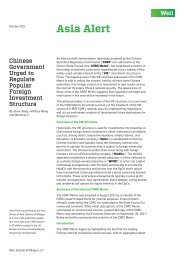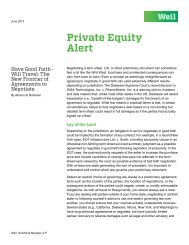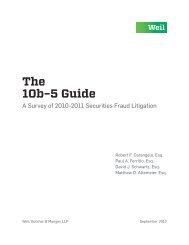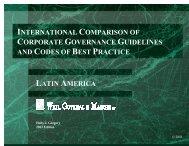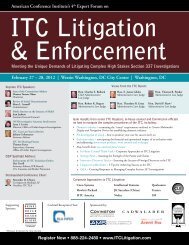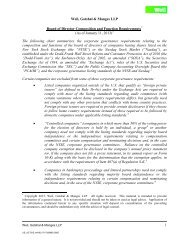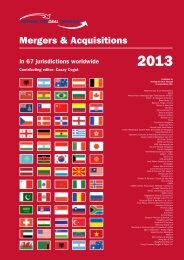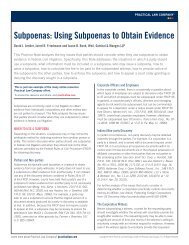Corporate Governance - Weil, Gotshal & Manges
Corporate Governance - Weil, Gotshal & Manges
Corporate Governance - Weil, Gotshal & Manges
Create successful ePaper yourself
Turn your PDF publications into a flip-book with our unique Google optimized e-Paper software.
United States<br />
<strong>Weil</strong>, <strong>Gotshal</strong> & <strong>Manges</strong> LLP<br />
and discussed certain matters with independent auditors to assess<br />
their views on the auditors’ independence, the quality of the corporation’s<br />
financial reporting and the name of the committee member<br />
with financial expertise (if any). Under section 406 of the Sarbanes-<br />
Oxley Act, companies are required to disclose whether they have<br />
adopted a code of ethics for their senior financial officers. If a company<br />
fails to adopt such a code it must explain why it did so. Certain<br />
changes to or waivers of any provision of the code must also be<br />
disclosed.<br />
Corporations are expected to keep all of this public information<br />
current by filing ‘current’ reports whenever certain specified<br />
events occur, as well as issuing press releases and providing website<br />
disclosure.<br />
Under the Sarbanes-Oxley Act, the reliability and accuracy of<br />
the financial and non-financial information disclosed in a company’s<br />
periodic reports has to be certified by the company’s CEO and CFO.<br />
In each quarterly report both officers must certify, among other<br />
things, that:<br />
• they reviewed the report;<br />
• to their knowledge the report does not contain a material misstatement<br />
or omission and that the financial statements and other<br />
financial information in the report fairly present, in all material<br />
respects, the financial condition of the company, its results of<br />
operations and cash flows for the periods covered in the report;<br />
• they are primarily responsible for the company’s controls and<br />
procedures governing the preparation of all SEC filings and submissions,<br />
not just the periodic reports subject to certification; and<br />
• they evaluated the ‘effectiveness’ of these controls and procedures<br />
and reported to the audit committee any significant deficiencies<br />
or material weaknesses in the company’s financial reporting controls,<br />
together with any corrective actions taken or to be taken.<br />
Their conclusions must be disclosed in the certified report.<br />
NYSE-listed companies are required to disclose their corporate governance<br />
guidelines. Committee charters (if any) must be disclosed as<br />
described in detail in question 27.<br />
In 2003, the SEC adopted rules that require reporting companies<br />
to disclose in their proxy statements or annual reports certain<br />
information regarding the director nomination process, including:<br />
• whether the company has a nominating committee and, if not,<br />
how director nominees are chosen;<br />
• whether the members of the nominating committee are<br />
independent;<br />
• the process by which director nominees are identified and<br />
evaluated;<br />
• whether third parties are retained to assist in the identification<br />
and evaluation of director nominees;<br />
• minimum qualifications and standards used in identifying potential<br />
nominees;<br />
• whether nominees suggested by shareholders are considered; and<br />
• whether nominees suggested by large, long-term shareholders<br />
have been rejected.<br />
These rules also require reporting companies to disclose certain<br />
information regarding shareholder communications with directors,<br />
including:<br />
• the process by which shareholders can communicate with directors<br />
(and, if the company does not have an established process,<br />
why it does not);<br />
• whether communications are screened and, if so, how;<br />
• any policies regarding the attendance of directors at AGMs; and<br />
• the number of directors that attended the preceding year’s AGM.<br />
In 2006, the SEC adopted rules that require reporting companies to<br />
disclose in their proxy statements or annual reports certain information<br />
regarding the corporate governance structure that is in place for<br />
considering and determining executive and director compensation,<br />
including:<br />
• the scope of authority of the compensation committee;<br />
• the extent to which the compensation committee may delegate<br />
any authority to other persons, specifying what authority may<br />
be so delegated and to whom;<br />
• any role of executive officers in determining or recommending<br />
the amount or form of executive and director compensation; and<br />
• any role of compensation consultants in determining or recommending<br />
the amount or form of executive and director compensation,<br />
identifying such consultants, stating whether such<br />
consultants are engaged directly by the compensation committee<br />
or any other person, describing the nature and scope of their<br />
assignment and the material elements of the instructions or directions<br />
given to the consultants with respect to the performance of<br />
their duties under the engagement.<br />
Moreover, in late 2009, the SEC adopted rules requiring companies<br />
to provide the following enhanced proxy statement disclosures:<br />
• for each director and nominee, the particular experience, qualifications,<br />
attributes or skills that led the board to conclude that<br />
the person should serve as a director of the company;<br />
• other directorships held by each director or nominee at any public<br />
company during the previous five years (rather than only current<br />
directorships);<br />
• expanded legal proceedings disclosure relating to the past ten<br />
years (rather than five years);<br />
• whether and, if so, how the nominating committee considers<br />
diversity in identifying nominees for director; if the nominating<br />
committee has a policy with regard to the consideration of<br />
diversity in identifying director nominees, how this policy is<br />
implemented and how the nominating committee or the board<br />
assesses the effectiveness of its policy;<br />
• the board’s leadership structure and why the company believes it<br />
is the best structure for the company; whether and why they have<br />
chosen to combine or separate the CEO and board chairman<br />
positions; where these positions are combined, whether and why<br />
the company has a lead independent director and the specific<br />
role the lead independent director plays in the leadership of the<br />
company;<br />
• the board’s role in the oversight of risk management and the<br />
effect, if any, that this has on the company’s leadership structure;<br />
• the company’s overall compensation policies or practices for all<br />
employees generally, not just executive officers, ‘if the compensation<br />
policies and practices create risks that are reasonably likely<br />
to have a material adverse effect on the company’; and<br />
• fees paid to and services provided by compensation consultants<br />
and their affiliates if the consultants provide consulting services<br />
related to director or executive compensation and also provide<br />
other services to the company in an amount valued in excess of<br />
$120,000 during the company’s last fiscal year.<br />
In early 2010, the SEC also issued an interpretive release on disclosure<br />
relating to climate change, which is intended to provide guidance<br />
to reporting companies on the application of existing disclosure<br />
requirements to climate change and other matters. In addition, in<br />
September 2010, the SEC issued an interpretive release relating to<br />
disclosure of liquidity and funding risks posed by short-term borrowing<br />
practices.<br />
The SEC recently issued disclosure guidance relating to cybersecurity<br />
(October 2011) and European sovereign debt exposure<br />
(January 2012), among other matters.<br />
In 2011, the SEC approved final rules relating to advisory votes<br />
on executive compensation (say-on-pay) pursuant to the Dodd-Frank<br />
Act, which also require companies to include a discussion in the<br />
proxy statement as to whether and, if so, how the company has<br />
280 Getting the Deal Through – <strong>Corporate</strong> <strong>Governance</strong> 2012


